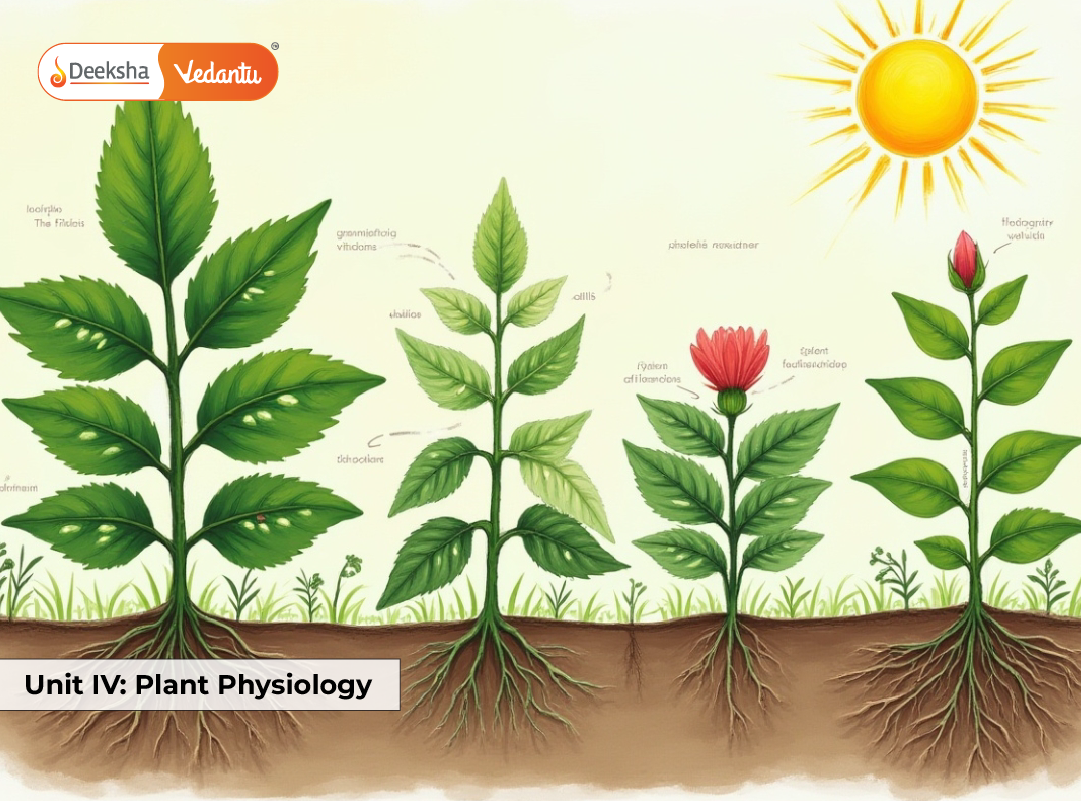
Plant Physiology is a foundational unit in NEET Biology and plays a pivotal role in understanding how plants function at both the cellular and organismal levels. This unit encompasses three highly conceptual chapters that describe critical physiological processes such as photosynthesis, cellular respiration, and overall growth and development in plants. These processes form the basis for energy conversion, biomass accumulation, and adaptation to environmental factors in plants.
For NEET aspirants, mastering this unit is essential because it integrates principles from biochemistry, molecular biology, and ecology. The concepts are often tested in the form of MCQs, assertion-reasoning types, diagram labeling, numerical problems (like RQ calculation), and matching columns. A well-prepared student can confidently tackle 6–8 questions in NEET just from this unit, especially if they’ve understood pathway flowcharts, plant hormone functions, and regulatory mechanisms.
NEET Relevance of Plant Physiology
Total Chapters Covered: 3 (Photosynthesis in Higher Plants, Respiration in Plants, Plant Growth and Development)
Approximate NEET Weightage: 10–12% (Roughly 6–8 questions)
This unit consistently appears in NEET exams due to its foundational concepts that connect cellular mechanisms to whole-plant functions. The relevance lies in its high integration of concepts like energy transformation (ATP generation and usage), regulation by plant hormones, and the cellular pathways that convert sunlight and organic substrates into usable biological energy. From diagram-based MCQs to assertion-reason questions and numericals (e.g., RQ calculations), Plant Physiology offers multiple scoring opportunities.
Over the years, trends show that NEET places significant emphasis on Chapters 11 and 12 for conceptual and factual recall questions. Diagrams from this unit — especially the Z-scheme, glycolysis pathway, and hormone charts — are commonly tested. Moreover, understanding the stages of plant development (covered in Chapter 13) helps aspirants tackle indirect questions related to flowering, growth, and seed dormancy.
Thus, a deep grasp of Plant Physiology not only boosts marks in NEET but also aids in understanding advanced topics in Class 12 and beyond.
Chapter-Wise Breakdown
Chapter 11: Photosynthesis in Higher Plants
This chapter deals with the process by which green plants synthesize organic compounds using sunlight. It is one of the most heavily emphasized topics in NEET due to its direct relation to energy transformation.
NEET Focus Areas:
- Structure and functional role of chloroplasts, types of photosynthetic pigments (chlorophyll a, b, carotenoids)
- Light reaction processes including photolysis of water, Z scheme of electron transport, photophosphorylation (cyclic and non-cyclic)
- Dark reaction – Calvin Cycle with steps like carboxylation, reduction, and regeneration
- Comparative features of C3, C4, and CAM pathways with examples
- Mechanism and consequences of photorespiration; role of Rubisco in both carboxylation and oxygenation
Expected NEET Questions: 2–3
Common Formats: MCQs on light and dark reactions, diagram-based questions on Z scheme, comparison between pathways, and identifying limiting factors
Chapter 12: Respiration in Plants
This chapter explores how plants release energy from organic molecules through controlled enzymatic steps. It is significant in NEET for understanding energy yield, pathway sequence, and respiratory substrates.
NEET Focus Areas:
- Detailed breakdown of glycolysis, link reaction, TCA (Krebs) cycle, and oxidative phosphorylation
- Electron Transport System (ETS) located in the inner mitochondrial membrane and the process of chemiosmosis
- Differences between aerobic and anaerobic respiration including net ATP yield
- Respiratory Quotient (RQ) values for carbohydrates, fats, proteins, and organic acids
- Alternative pathways like fermentation (alcoholic and lactic acid) with practical examples
Expected NEET Questions: 2–3
Common Formats: Diagram sequencing, numerical RQ calculations, enzyme-related MCQs, match the pathway with ATP yield
Chapter 13: Plant Growth and Development
This chapter delves into how plants grow and the hormones that regulate their growth, development, and response to stimuli. It’s concept-heavy and ties into NEET questions related to physiology and biochemistry.
NEET Focus Areas:
- Growth curve phases: lag phase, log phase, and stationary phase – often tested with graphical representation
- Functions of plant hormones (PGRs) – auxin, gibberellin, cytokinin, ethylene, and abscisic acid (ABA)
- Seed dormancy and germination: conditions, types, and physiological mechanisms
- Photoperiodism and vernalisation: impact on flowering and seasonal cycles
- Differentiation, dedifferentiation, and redifferentiation in plant cells
Expected NEET Questions: 1–2
Common Formats: Assertion-reason types, match the hormone to function, diagrams of growth curve, and terminology-based questions
NEET-Focused Summary Table
| Chapter | Expected Questions | High-Yield NEET Topics |
| Photosynthesis in Higher Plants | 2–3 | Z scheme, Rubisco function, C3 vs C4, photorespiration |
| Respiration in Plants | 2–3 | Glycolysis, ETS, ATP accounting, RQ calculation |
| Plant Growth and Development | 1–2 | Hormones (auxin, gibberellin), growth phases, photoperiodism |
NEET Illustrative Questions
- MCQ: Which of the following is a C4 plant?
a) Wheat
b) Rice
c) Maize
d) Pea
Answer: c) Maize - Assertion & Reason:
- Assertion: ABA induces stomatal closure during drought stress.
- Reason: ABA promotes potassium ion efflux leading to water loss from guard cells.
Answer: Both Assertion and Reason are true, and Reason is the correct explanation.
- Diagram-based: Label the parts of a chloroplast involved in the light reaction.
Answer: Thylakoid membrane, stroma, grana - Numerical Question:
- What will be the RQ if glucose is used as the respiratory substrate?
Answer: 1
- What will be the RQ if glucose is used as the respiratory substrate?
- Match the Following:
- a) Leghemoglobin – i) Nitrogen fixation
- b) Cytokinin – ii) Cell division
- c) ETS – iii) Inner mitochondrial membrane
- d) C4 cycle – iv) Bundle sheath cells
Answer: a-i, b-ii, c-iii, d-iv
- Flowchart Completion:
- Fill in the missing step in this glycolysis sequence: Glucose → Glucose-6-phosphate → ? → Fructose-1,6-bisphosphate
Answer: Fructose-6-phosphate
- Fill in the missing step in this glycolysis sequence: Glucose → Glucose-6-phosphate → ? → Fructose-1,6-bisphosphate
- Conceptual MCQ:
- Which hormone promotes cell elongation and apical dominance?
a) Cytokinin
b) Auxin
c) Gibberellin
d) ABA
Answer: b) Auxin
- Which hormone promotes cell elongation and apical dominance?
FAQs
1. How many questions from Plant Physiology are asked in NEET?
On average, this unit contributes 6 to 8 questions. Each chapter has high-probability subtopics that appear in NEET Biology almost every year.
2. Which chapter in Plant Physiology has the highest weightage?
Photosynthesis in Higher Plants and Respiration in Plants are the most weighted, often contributing over 4 questions combined.
3. Are diagrams important from this unit?
Yes, extremely. NEET has frequently tested labeled diagrams such as the Z scheme, Krebs cycle, glycolysis pathway, and hormone comparison tables.
4. What is the best strategy to prepare for Plant Physiology for NEET?
Master NCERT first. Focus on drawing flowcharts, preparing quick comparison tables, solving PYQs, and revising using flashcards for enzymes and hormone functions.
5. Can questions from this unit be purely conceptual?
Absolutely. NEET often frames tricky conceptual MCQs around photorespiration, ATP yield, plant growth stages, and hormone interaction. Deep understanding helps eliminate options correctly.
Conclusion
Plant Physiology is not just a theoretical unit—it’s highly application-based and directly linked to many real-life and experimental biology questions seen in NEET. Focusing on this unit improves both retention and problem-solving accuracy in the NEET Biology section. With an integrated study of pathways, regulatory mechanisms, and growth patterns, aspirants can significantly boost their score. The upcoming individual chapter breakdowns will provide even more focused explanations, NEET tips, and practice questions tailored to each topic.











Get Social